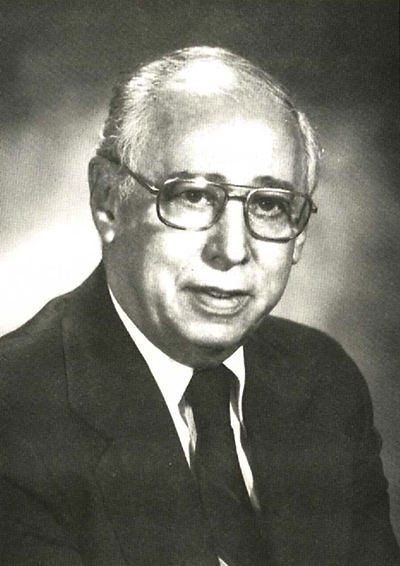
“Rabbi James A. Wax”. Manuscript Collection Finding Aids, DIG Memphis.
February 19, 1968
City and labor representatives met last night to discuss the current sanitation worker strike at the behest of members of the Memphis Ministers Association’s Race Relations Committee. The association’s president, Rabbi James Wax, organized the meeting to help encourage communication between both parties. Unfortunately, despite holding talks all night, the meeting was unsuccessful in breaking the stalemate between the two sides.
Consisting of over 100 local ministers from a variety of backgrounds, the Memphis Ministers Association celebrated “Race Relations Sunday” this prior Sunday where they advocated for an end for racial discrimination. They see the strike as increasing the racial tension in the city, which they have been actively working to address, so they decided to do what they can to improve the situation. Prior to organizing the meetings, Wax had asked P.J. Ciampa to defer the strike for two or three weeks so negotiations could proceed with the city representatives who refused to negotiate with illegal strikers. Ciampa replied that they could not as he could lose faith with the strikers and another group may move to replace the union. This position was further reinforced on the 17th when the union again refused a city request that the workers return to work to continue negotiations. Faced with no alternative, the ministers arranged the meeting in the hopes of easing racial tension by assisting to end the strike.
Organizing and conducting the meeting was a sensitive affair for Wax. Ciampa and other union representatives were eager to attend the meeting, but Mayor Loeb would not attend until it was agreed that the press be present. Loeb also made it clear that he was only attending out of respect for the ministers. Because of the city’s position that the strike was illegal, he would not negotiate until the workers returned to work. This created an awkward beginning to the meeting as Loeb refused to address Ciampa directly without a promise to end the strike, which Ciampa would not provide. Thus, one party would speak to Wax and the other party would respond to Wax. This process was particularly uncomfortable for Wax because the ministers had taken the position that they would facilitate discussion between the two parties by hosting the meeting. The ministers specifically did not mediate because they wanted to remain impartial and avoid being accused of taking sides. Nevertheless, Wax led the parties through a discussion of the nine sanitation worker issues provided by union representatives. He began with the least contentious issue and once discussion came to a stop, he moved to the next least contentious issue. After over four hours of talks, a break was called at 11:15pm with only four of the nine strike issues discussed.

“St. Mary’s Episcopal Church”. The Nadia Price Photography Collection, DIG Memphis.
The second session began after midnight with the addition of Jerry Wurf, AFSCME International President. This session also differed in that Loeb spoke directly to Wurf. Seeing this change in behavior and the addition of a new union leader, Wax again pleaded for each side to defer or settle the strike because it was creating a dangerous situation in the community. Wax worried that Wurf did not fully understand the racial conditions in the city when he called the strike. However, neither side was willing to submit to the other – the union could not call off the strike without losing support and the city saw itself in a position of strength. Once the discussions concluded at 5 am, Wax believed seven of the nine issues had been agreed on broad terms, but two significant issues remained unsettled: the city’s refusal to recognize the union and allowing union dues check-offs. Wurf had offered a compromise to have a credit union withdraw the dues instead of the city, but the city would not accept this proposal. Similarly, Wurf claims the union has agreed to concessions on pensions, insurance, and hospitalization while Loeb has made no concessions since the strike started.
Rabbi Wax and Dean William Dimmick plan to bring the parties together several times over the coming weeks to continue to facilitate talks. After the previous night’s experience, however, Wax questions the ability of the ministers to aid the parties reach an end to the strike.
“Debate of Garbage Centered on Wages.” Press Scimitar, February 19, 1968.
“Garbage Becomes Problem; Talks Go On.” Press Scimitar, February 19, 1968.
”Garbage Deadlock Remains.” Press Scimitar, February 20, 1968.
Involvement of Rabbi James A. Wax in Sanitation Strike, April 1968. Box 5, Folder 6. Rabbi James A. Wax Collection. History Department, Memphis Public Libraries, Memphis, TN.
Kellett, Robert. “Loeb, Strike Leaders Trade Talk.” The Commercial Appeal, February 19, 1968.
Letter from Henry Loeb to Local Ministers, February 27, 1968. Box 5, Folder 6. Rabbi James A. Wax Collection. History Department, Memphis Public Libraries, Memphis, TN.
Letter from James A. Wax to Joseph A. Durick, D.D., March 5, 1968. Box 5, Folder 3. Rabbi James A. Wax Collection. History Department, Memphis Public Libraries, Memphis, TN.
Letter from Joseph A. Durick, DD. to Memphis Ministers, February 7, 1968. Box 5, Folder 3.Rabbi James A. Wax Collection. History Department, Memphis Public Libraries, Memphis, TN.
Letter from Rabbi James A. Wax to Rabbi Richard G. Hirsch, May 29, 1968. Box 5, Folder 6. Rabbi James A. Wax Collection. History Department, Memphis Public Libraries, Memphis, TN.
On the Sanitation Department Strike: Let Our Position Be Crystal Clear, undated. Box 5, Folder 6.Rabbi James A. Wax Collection. History Department, Memphis Public Libraries, Memphis, TN.
Sanitation Strike Issues provided to Rabbi James A. Wax, undated. Box 5, Folder 6. Rabbi James A. Wax Collection. History Department, Memphis Public Libraries, Memphis, TN.
Template Letter from Mrs. Robert W. Shafer to Fathers, February 28, 1968. Box 5, Folder 3. Rabbi James A. Wax Collection. History Department, Memphis Public Libraries, Memphis, TN.
Thornton, Charles. “Loeb, Ciampa May Meet Tonight.” The Commercial Appeal, February 18, 1968.






